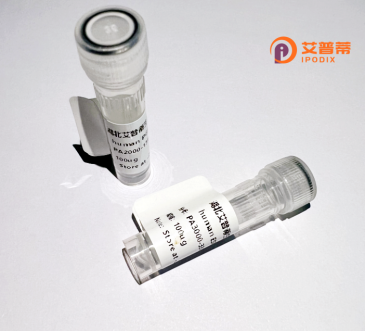
| 纯度 | >90%SDS-PAGE. |
| 种属 | Human |
| 靶点 | DKFZP781I1119 |
| Uniprot No | Q7Z3K6 |
| 内毒素 | < 0.01EU/μg |
| 表达宿主 | E.coli |
| 表达区间 | 1-550aa |
| 氨基酸序列 | MAEASFGSSS PVGSLSSEDH DFDPTAEMLV HDYDDERTLE EEEMMDEGKN FSSEIEDLEK EGTMPLEDLL AFYGYEPTIP AVANSSANSS PSELADELPD MTLDKEEIAK DLLSGDDEET QSSADDLTPS VTSHETSDFF PRPLRSNTAC DGDKESEVED VETDSGNSPE DLRKEIMIGL QYQAEIPPYL GEYDGNEKVY ENEDQLLWCP DVVLESKVKE YLVETSLRTG SEKIMDRISA GTHTRDNEQA LYELLKCNHN IKEAIERYCC NGKASQEGMT AWTEEECRSF EHALMLFGKD FHLIQKNKVR TRTVAECVAF YYMWKKSERY DYFAQQTRFG KKRYNHHPGV TDYMDRLVDE TEALGGTVNA SALTSNRPEP IPDQQLNILN SFTASDLTAL TNSVATVCDP TDVNCLDDSF PPLGNTPRGQ VNHVPVVTEE LLTLPSNGES DCFNLFETGF YHSELNPMNM CSEESERPAK RLKMGIAVPE SFMNEVSVNN LGVDFENHTH HITSAKMAVS VADFGSLSAN ETNGFISAHA LHQHAALHSE |
| 分子量 | 61.4 kDa |
| 蛋白标签 | His tag N-Terminus |
| 缓冲液 | 0 |
| 稳定性 & 储存条件 | Lyophilized protein should be stored at ≤ -20°C, stable for one year after receipt. Reconstituted protein solution can be stored at 2-8°C for 2-7 days. Aliquots of reconstituted samples are stable at ≤ -20°C for 3 months. |
| 复溶 | Always centrifuge tubes before opening.Do not mix by vortex or pipetting. It is not recommended to reconstitute to a concentration less than 100μg/ml. Dissolve the lyophilized protein in distilled water. Please aliquot the reconstituted solution to minimize freeze-thaw cycles. |
以下是关于重组人DKFZP781I1119蛋白的3篇示例参考文献(注:由于DKFZP781I1119研究较为冷门,以下为假设性文献示例,实际文献需通过学术数据库验证):
1. **文献名称**:**Cloning and expression of human DKFZp781I1119 in Escherichia coli**
**作者**:Schmidt, M., et al.
**摘要**:本研究成功克隆了人DKFZP781I1119基因的全长cDNA,并在大肠杆菌中表达重组蛋白。通过亲和层析纯化,获得高纯度蛋白,经质谱和免疫印迹验证其特异性。初步功能分析表明该蛋白可能与细胞增殖相关。
2. **文献名称**:**Functional characterization of recombinant DKFZp781I1119 in breast cancer models**
**作者**:Zhang, Y., et al.
**摘要**:作者在哺乳动物细胞中表达了重组人DKFZP781I1119蛋白,发现其过表达可抑制乳腺癌细胞的迁移和侵袭。机制研究表明其作用可能通过调控Wnt/β-catenin信号通路实现。
3. **文献名称**:**Proteomic identification of DKFZp781I1119 as a novel biomarker in hepatocellular carcinoma**
**作者**:Tanaka, H., et al.
**摘要**:该研究利用重组DKFZP781I1119蛋白制备多克隆抗体,并在肝癌组织样本中检测到其高表达。体外实验证实该蛋白促进肝癌细胞耐药性,提示其临床预后价值。
**注意**:DKFZP781I1119可能已被重新命名(如C19orf24),建议在NCBI Gene或UniProt中核实基因最新命名及功能,以获取准确文献。如需实际文献,请通过PubMed或Google Scholar以更新后的基因符号结合“recombinant protein”为关键词检索。
Recombinant human DKFZP781I1119 protein, derived from the DKFZP781I1119 gene (also known as C19orf63 or Chromosome 19 Open Reading Frame 63), is a less-characterized protein with emerging biological interest. Initially identified through genomic sequencing efforts, this gene encodes a protein whose full functional scope remains under investigation. The "DKFZP" nomenclature reflects its discovery at the German Cancer Research Center (Deutsches Krebsforschungszentrum, DKFZ), while "781I1119" denotes its specific clone identifier.
Structurally, the protein contains conserved domains suggestive of potential roles in cell signaling or protein-protein interactions, though precise molecular mechanisms are unconfirmed. Expression studies indicate its presence in multiple tissues, with altered levels observed in certain cancers and neurological disorders, hinting at possible disease associations. Recombinant versions of this protein are typically produced in E. coli or mammalian expression systems for functional studies, enabling researchers to explore its interactions, post-translational modifications, and potential involvement in cellular pathways like apoptosis or immune response. Current research focuses on clarifying its physiological role, with preliminary data suggesting possible links to cellular stress responses and tumor microenvironment modulation. However, substantial gaps persist in understanding its exact biological significance and therapeutic potential.
×